#Deliberative Development
Note
what is your take on jaime infant trebuchet threat?
here is my read of it:
I take into heavy consideration how it is contextualized by the preceding chapters and Jaime’s development in general. A very important thing about how Jaime changes is that it is not just about morality, knighthood, honor, etc. He is also noticeably developing in how he approaches things along with his relationship to the self + the fact that he is more conscious: he is confronting things, he is using his brain (everybody please clap)
“His brother never untied a knot when he could slash it in two with his sword.”
Now, because Jaime’s relationship with his idealism, his honor, his self etc. has changed so drastically, this situation becomes a knot. There is no more “most expedient way to achieve my goal enabled through my cynical ‘pragmatism’.” This is a knot that he can’t cut through because that would be going against keeping an oath, an oath that now means something to him again. And Jaime has reflected on his gordian knot approach since his hand loss.
Let’s see what problem the Blackfish poses:
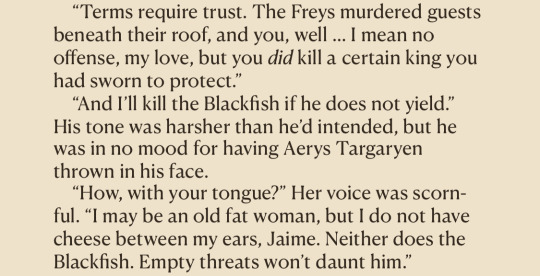
From Jaime’s perspective, his resolve is an iron fortress. There is an emphasis that idle threats do not work on him.

What does Jaime primarily learn from this roast session from Brynden? The reputation that he (and his family) had earned for him will not allow for negotiation. Not with someone like Brynden. It does not only speak of how dysfunctional Tywin’s method is in the long term, but also how Jaime has a persona in the collective consciousness. It is something that will not go away, perhaps ever. He has reflected about how he no longer has the means to cut through his problems in a literal sense, and cutting through this knot in a less literal sense would lead to bloodshed and the breaking of vows (I wanna add that it is also not a simple situation where rejecting his role and abandoning this situation all together is a necessarily clean alternative. Jaime is an instrument of a regime, he is not the ultimate power here, he belongs to the crown, and he isn’t irreplaceable, so it is not like he as an independent force can make Lannister presence disappear here, even if he wanted to. Running from this knot would not fix anything, especially from the perspective that Brynden is doing nothing but a stubborn last stance with no end goal other than bringing as many Lannisters down to hell with him. While the ‘peace’ that he will create here is obviously temporary, and an uprising is brewing, his motivations and outlook in his current position are important. The siege remaining unresolved leads to the suffering of all sides involved, the Riverlands, already devastated by war, is starving, on top of this all being a threat to his family. The Blackfish scoured the country clean and expelled all useless mouths, the siege not being solved also leads to people starving. ) We can see how and why he now has to resort to new approaches, something he has learned previously in ASoS:

Tyrion would find a way. Let us use the cards we have been dealt. Especially the reputation that is used against us.
Also, what do the people around him suggest:

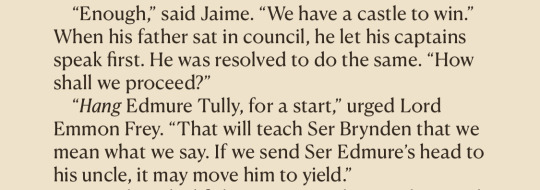
“Execute Edmure. Show that our threats are not idle”
Edmure is the key, is what Jaime eventually realizes, but not like that. What does Jaime do? He does not end up killing Edmure to show his threats have legitimacy to Brynden (part of it is the logical conclusion he makes about how that would strengthen his resolve, BUT he also does not go with a baby trebuchet threat to Brynden. I personally do not think Brynden is coldhearted enough to take that threat lightly (we know Jaime and co’s thoughts are a different matter), especially if he does not view it as an idle one. But the risk of the bluff being called is more present with Bryden, and then Jaime loses all credibility and chances to avoid bloodshed. There is a reason George wrote this how it is. I think we are supposed to scrutinize what exactly Jaime is saying, and to deliberately who.) He doesn’t execute Edmure and then go to Brynden with a baby trebuchet tier threat with the pretense that his threats are not empty anymore. No, he ends up using Edmure.
A Lannister pays his debts, he thought, and you’re the only coin that’s left to me.
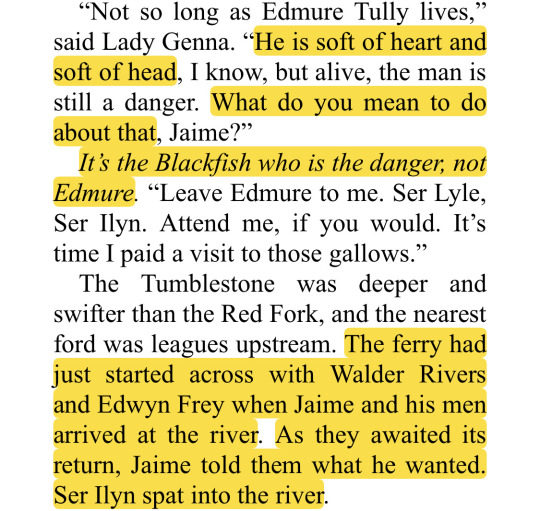
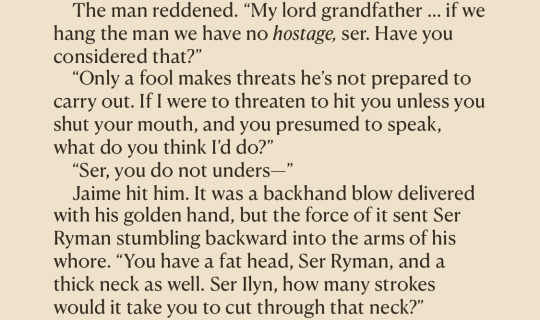
He says this aloud. This is not a thought. This is not something he is reflecting upon based on everything that has been going on in the past chapters. This is a deliberate performance people are watching, specifically Edmure is watching.
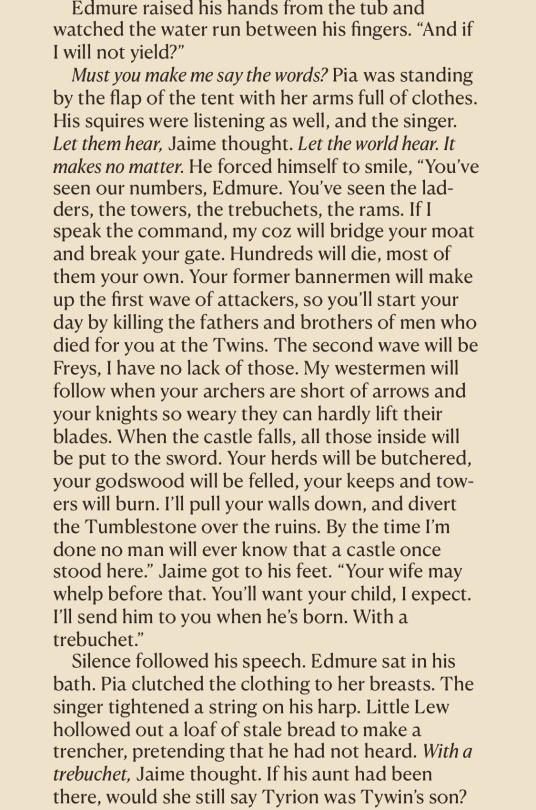
“Must you make me say the words.” “He forced himself to smile” etc. He seems to have conflict with even getting these words out, because the people that are present, who he seemed to have built a relationship with, and presented the side of himself that is not just his ignoble reputation. We know Jaime has a very complicated relationship with his self concept, he is desperate for self affirmation as well as not being perceived as monstrous. Yet there is no alternative path here. There is a reason George sets this up: in order to keep his vow he has to embrace his reputation and make use of it instead of trying to save it. The part of this speech that I am showing here are Tywin’s words coming from his mouth. Genna pointed out something: (I do wanna say that there are nuances here, I also do not think this means Tyrion is some final villain and as horrible and cruel as Tywin) Jaime is not Tywin’s “son” (also foreshadowed when Tywin disowns him in ASoS: “You are not my son.” I always thought this was thematically significant considering the choices he starts making at that point). The emulation he does is supposed to be inauthentic. Again, Brynden does not care for these threats, but “soft-hearted” (not saying I agree with this sentiment, not even Jaime does as per ADwD, but it is the reputation he has in a classist and violently patriarchal society lol) Edmure does. Everything is set up by Jaime in this interaction seems to rely on this. If Edmure does not give in, the knot remains. If the knot remains, Jaime feels he would have to cut through it to keep his other vow (to his king and family), and if that is the case he is ready to die on the battlefield immediately because he does not really want to live with himself and his lack of progress (“Just more shit in the bucket. Jaime resolved to be the first man on the battlements. And with this golden hand of mine, most like the first to fall.”). Furthermore, I do not see the point of Jaime doing child trebucheting on top of breaking his vow and following up on what he told Brynden that he would do, especially if he feels recklessly suicidal enough over just having to break his vow lol. What would be the point? You could argue that Jaime can be self destructive enough to do it just to put it into stone how horrible he is, and then recklessly die, but again I do not think thats even a necessity for that for him atp. Jaime is not someone like Tywin. He is not about crazy acts of ruthlessness to overcompensate for a lack of dominance. His primary insecurity is not people not fearing him or questioning his authority, it is people perceiving him as a monstrous oathbreaker. To me, him comparing himself to Tywin here did not primarily feel like: “I really showed it to Genna, I am actually Tywin”, it was also a somber observation connected to this specific insecurity (ntm how Jaime views Tywin: “My father is dead as well” “May the Father judge him justly.” Now, there's an awful prospect.) Even if he keeps trying to emulate aspects of Tywin, I think he is aware deep down that that it incompatible with what he wants to be (see the anti-parallels in his ADwD chapter). I also put a lot more weight to Genna’s words about this because Jaime also seems very caught up in “these threats and methods are not chivalric”, not “they underestimate my strength.” (Lady Genna suggested that a few of the men might be put to the question. He refused. “I gave Edmure my word that if he yielded, the garrison could leave unharmed.” “That was chivalrous of you,” his aunt said, "but it's strength that's needed here, not chivalry." Ask Edmure how chivalrous I am, thought Jaime. Ask him about the trebuchet) Not to mention we have to think about Jaime’s main motivation in emulating Tywin.
Another big thing that is informative: Jaime’s guilt over Rhaegar’s children and that he did not protect them from his own father. If he is someone that feels guilt over that in his subconscious post-hand loss, would he really be capable of going through with this threat now? Not to mention the situation with Bran atp: link.
and where are we at ADwD?:
For an instant, the deep red clouds that crowned the western hills reminded him of Rhaegar’s children, all wrapped up in crimson cloaks.
“Is that why you killed all the Starks?”
“Not all,” said Jaime. “Lord Eddard’s daughters live. One has just been wed. The other …” Brienne, where are you? Have you found her? “… if the gods are good, she’ll forget she was a Stark. She’ll wed some burly blacksmith or fat-faced innkeep, fill his house with children, and never need to fear that some knight might come along to smash their heads against a wall.” The moment he reiterates Tywin’s dogma, he is flooded with all of this. His last decision in this chapter is going with Brienne, abandoning his position, abandoning his pursuit of the brotherhood (ntm how he didn’t parallel his father or the mountain and left the smallfolk alone despite them potentially holding information about the brotherhood) and disappearing with her because he is told Sansa would die otherwise, despite Tywin’s very dogma of “dead men and dead sons claim no vengeance.” It is not only treason, it is a risk in general. He is crippled and considerably more powerless, Brienne is injured, and yet they disappear together without a trace.
I think a more substantive criticism of Jaime and the handling of the Riverrun situation, other than a bunch of morally darker actions that he actually takes to ensure he is diminishing the threats against his family, is that he would supposedly forsake his vow for Cat in favor of the vow sworn to his king if he is truly completely cornered, which is the statement that he contradicts in ADwD anyways. (If the Blackfish would not listen, he would have no choice but to break the vow he'd made to Catelyn Stark. The vow he'd sworn his king came first.) This is not what your #kingslaying taught us my guy. Ofc, with Jaime and his narration it is always a bit of a gamble: not a moment later he is ready to say fuck it and die in trial by combat to escape the knot (return of the passive suicidal ideation, even saying that if he loses they lift the siege —the siege is out of his control once he dies so I suppose that lets him escape the vow to his king? still lmao—) And again, we see what vow he ends up prioritizing in ADwD. He started out the chapter thinking he is finally gonna return to his place by his king and son, after completing his orders, his primary vow, but…
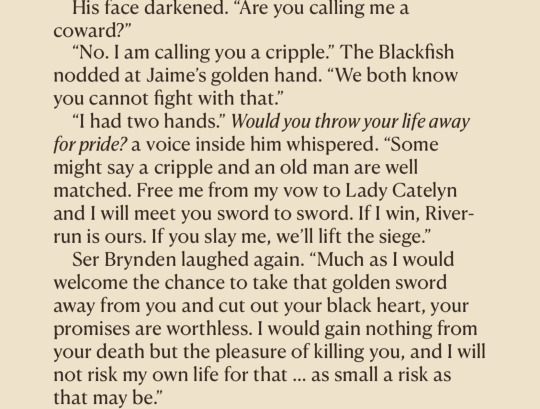
It is also his old version seeping through. The one that does not want to face dilemmas. The one that is willing to escape them even if that means death. Again, dying for him is easy, living with difficult choices to make is hard.
“As I was fucking her, Cersei cried, 'I want.' I thought that she meant me, but it was the Stark girl that she wanted, maimed or dead.” The things I do for love. “It was only by chance that Stark's own men found the girl before me. If I had come on her first . . .” The pockmarks on Ser Ilyn's face were black holes in the torchlight, as dark as Jaime's soul.
Here is another thing to note, though. Jaime is also someone who, at some point in his life, was ready to do horrible things to an innocent child, with no “justification” like with Bran. He was so detached from his conscience that we was capable of this. This is at a point where he disconnected completely from his morality, and allowed his disillusionment to enable his behavior. He is aware of this. He starts reflecting on this, especially in relation to his evaluation of his relationship with Cersei. That is why he confesses to Ilyn (who is already a metaphor of the man Jaime became: the Lannister executioner, a sword for death etc etc). This is something that makes his soul dark, as pointed out by his narration. The fact that he acknowledges and reflects on this already speaks of change (not to mention that this confession is contextualized with him switching to real swords, taking Ilyn, a literal executioner, into a forest with no one around, and being like “kill me if you can” right after. I do not think Jaime is very happy or delusional with himself as a person here lmao). We do not learn of this from Cersei or anything. Jaime is the one confronting himself here. Jaime is no longer on autopilot. Jaime is trying to confront things. His moral compass is no longer locked away in his deep subconscious. The question now is whether that moral compass will win over all of his struggles with perception, his internal conflicts of his family facing an existential threat and the deterioration they cause and reinforce, and the ghosts of his past. That is what AFfC is starting to interrogate, along with hammering it home that certain vows will never be able to compromise, with many of Jaime’s delusions being forced to crumble one by one.
#i don’t necessarily think that people discussing the nuances of this is a bad thing either#like i think u can criticize many of jaime’s approaches and actions in these few chapters#what i dont like is ‘redemption man threatened to launch baby?? how can u think he changed at all’#find that obtuse and reductive#jaime lannister#valyrianscrolls#asoiaf#asoiaf meta#ask
200 notes
·
View notes
Note
If Steve Rogers functions as the Superman of the bunch, the noble hero out of the past who inspires the others to greatness, what exactly is Bucky Barnes role, especially as Captain America himself?
I don't think that's a very meaningful analogy because like. The Justice League and the Avengers are very different teams, and despite their fairly similar ethics Clark and Steve are possibly even more different guys.
Captain America's is a solid general all-rounder, very mid-level in terms of actual power. Problems are frequently too big for him. Superman is stupid strong--every so often something shows up that's more powerful than he is, but he spends most of his life finessing his way through using as much force as he needs without overshooting and causing unacceptable collateral damage. He can move planets.
Psychologically, there's a vast gulf there.
The legacy of Krypton and the, the myth of America are roughly the same shape but are worn in completely opposite ways. No one on Earth knows or cares about Krypton except through Superman, and even he doesn't remember it--sometimes Kara does--so it's just pretty shapes and a deep solemnity.
America is messy and current and in-your-face, it was there before Steve and it'll probably outlive him and sometimes he gets so fed up with its foreign policy decisions or civil rights abuses he puts on a different outfit or goes and lives in a bunker.
'Superman' is a big idea that rests entirely on Kal-El as a person and as a force; 'Captain America' as a concept might be built on Steve and his supersoldier status but it's not dependent on him, they keep making a point of that.
Meanwhile they've made Jon Superman but struggle mightily with how to do that without just making him his dad. Of course they'd be struggling less if they'd let him grow up at a normal speed or were willing to lean into what a fucking bizarre person he ought to be after seven years in a cave with his dad's evil twin; basically Jon Kent doesn't have a character right now and they think he can hold up a title. But actually they know he can't that's why they brought Clark back. Superman is a disaster right now.
So anyway. In classic terms, Bucky was the counterpart of Jimmy Olsen. Then he died--I believe this was established in a retcon in the 60s when they brought Cap back, when Marvel was getting its feet under it as the grounded, realistic superhero comic company.
Then Bucky and Jason Todd both came back in 2005 which was kind of embarrassing for everyone imo. Just like. Did you have to do that at the same time you're making each other's cheap stunts look even more stuntlike.
Bucky's actually done better over the last 18 years than Jason tbh, rip--I mean in terms of interesting stories and development. Jason got his own book and all, he just also was subjected to terrible discontinuity of character and was primarily written by Scott Lobdell for like a decade. Terrible.
In terms of who he can be compared to relative to Superman when he's being Captain America, I. Uhhhhhh. No one in any useful way, I don't think. The obvious place to look is the Death of Superman/Reign of the Supermen period, but like.
Does Bucky have anything really in common with Cyborg Superman other than being a traumatized cyborg? No. Does he have anything in common with The Kid (later Kon-El)? You'd think there'd be something but there really isn't. Each point they have in common (i.e. dehumanizing lab background) they have diametrically opposed relationships to.
Steve's had duplicates and impersonators, I think the anti-commie guy he beat up that time is kind of like his Cyborg Superman equivalent? Except there's a whole political ideology thing going on there which is just not present with Superman. Anyway, not relevant to Bucky.
...you can I think draw some kind of relationship between Sam Wilson as Captain America and John Henry Irons as Steel, because on the writing end of things there's a definite flavor match, in terms of very deliberately creating a very cool black man and holding him up as an exemplar in a superhero story that otherwise has not got a lot of black people in major roles, and making him the best person to uphold the legacy of the Very Important Hero Guy. Like certain conventions are utilized the same in both instances. In certain ways that was two versions of the same story.
But also not really; Irons was very much pinch-hitting and what made him the best was that he was the one determined to do the work rather than claim the glamor; it's a lot more ceremonious and torch-passing with Wilson. A different deal. Although in some ways that's just because Marvel has hung onto and deliberately invested in the Falcon for decades.
DC Comics stop doing weird stuff with Clark's family and identity and reinvest in the supporting cast challenge. Where is Steel what's going on with him. Does he exist in this timeline.
#ask#hoc est meum#Anonymous#this is a weird question lmao#comics#are you the same person from the other day#i have the covid i have nothing better to do than ramble so good timing
33 notes
·
View notes
Note
for the ask game, spy x family 🕶💣
Sorry for the delay! I got ambushed by rl and then ambushed myself for several more days and-- anyway, I had to put this under the cut because it got long. Thanks for asking!
my favorite female character
yor yor yor. I like her for a few reasons, but I think the main thing is just generally her main emotional arc thus far. how she wants to 'belong' but how she also needs to 'fit in' and how it also circles around the idea of normality. she thinks she wants to be normal when what she wants is to be accepted. and she knows she needs to be *seen* as normal for safety reasons (sth sth societal commentary even outside of the cold war backdrop) but she doesn't understand *how*. what does it mean to be a mother and to be a wife and what aspects of that does she want to fulfill for herself and which is she just doing because it's part of her cover.
she has all these needs and wants and hasn't yet figured out how to even begin untangling them. and despite that, she's still one of the most emotionally intelligent characters in the series.
my favorite male character
loid. he's the obvious option but still. I always tend to appreciate the anxious types and whilst technically all of the main three have their own little anxiety spirals, loid's way of overcomplicating things is my favourite. he's a very intriguing mix of anxiety, denial, and competence.
I am very much enjoying the length of time it's taking to wear him down. we only got full confirmation he's actively compromised as of the mole arc which is super recent but for me the pacing is just right. he has to earn that character development and be dragged through kicking and screaming.
my favorite book/season/etc
volume 10 (starts with [redacted] arc and has some good handler moments (though I *think* my favourite handler chapter is later on))
my favorite episode (if its a tv show)
genuinely not sure. I do think the very first episode has a really good mix of comedy and earnestness with a hint of the underlying tragedy in growing up during wartime. it spells out everything to expect down the line in a very nicely balanced way
my favorite cast member
I... don't know? I think for Yor's VA this is my favourite role of hers whilst Anya's VA I prefer most as Frieren but like. IDK tbh. Can I skip?
my favorite ship
Not super into shipping in this fandom, but overall, I'd say twiyor. the fact that it's a 'fake' relationship but they enter into it on honest enough terms that they actually make something really healthy for both of them out of it. they each mutually get something out of it too.
yor wants to be useful. she's grown up providing for yuri and now he's gone all she has left is her job, but this 'relationship' and her new family give her the opportunity to *do* something. to defend and protect her people. and to give her someone to confide in, where she's never had that before.
for twilight, he's always been planning and preparing for all possibilities. always acting, never letting anyone see what's beneath, until he had forgotten even himself. one of my fave twiyor moments was in the recent chapter where twilight gets home and immediately his legs give out, because he feels *safe*. he's let his guard down with yor and even if he's worried about being compromised, he let it down because he trusts in her character. the remedy for someone so full of masks is someone devoid of them, and for all that yor is the thorn princess, she has never faked *who* she is.
and tying back to what I was saying about yor and normality before. the fact that loid knows what it's like to pretend means that he's in the position to tell yor that she's good as she is. she doesn't *need* to fake her whole personality to fit in. sure, they both have their covers, but for the large part, what's beneath is genuine.
a character I’d die defending
I think nightfall's character may not be as developed as most people would like at this stage, but the way she's written is very deliberate. she's a compare/contrast with yuri (and also to some extent, with twilight) and she shows how love and obsession intertwine. how *obsession* can be dangerous. the mole arc to me is waving a big red flag above nightfall's head and saying that if she doesn't change something, if she keeps metaphorically diving headfirst in front of twilight, then she's going to end up the one riddled with bullets.
a character I just can’t sympathize with
not that we're likely supposed to but donovan desmond
a character I grew to love
handler! it's not that I ever disliked her as such, but for a long time she just seemed a kind of girlboss-esque character with a neat character design. she had her moments (bond arc speech and also propaganda chapter my beloved), but it wasn't until we had her focus chapter where we followed her day that I was like "oh." Like, I knew that she'd lost her family, but I was falling for the facade that she was on top of everything. And the realisation that she wasn't? That she was deep in depression, but you know who might dig her out of it? Her pet dog and a little girl. Definitely got to me.
my anti otp
anti otp is a bit strong a feeling for it, but I think the way I read damianya differs from a decent chunk of the fandom. I tend to see it as one-sided and am perfectly happy for it to stay that way or for them to just end up becoming better friends down the line, but I know what I'm against here so I'm not going to place any bets.
8 notes
·
View notes
Text
Photos from my Opera Garnier Trip 2 of 3
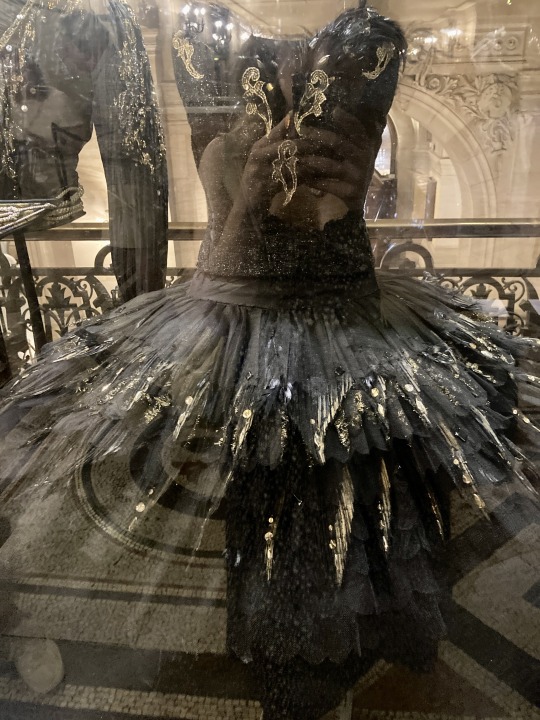
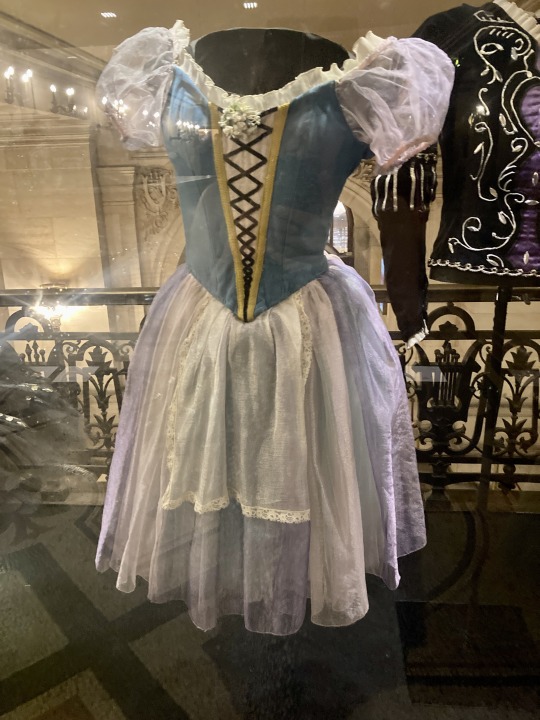

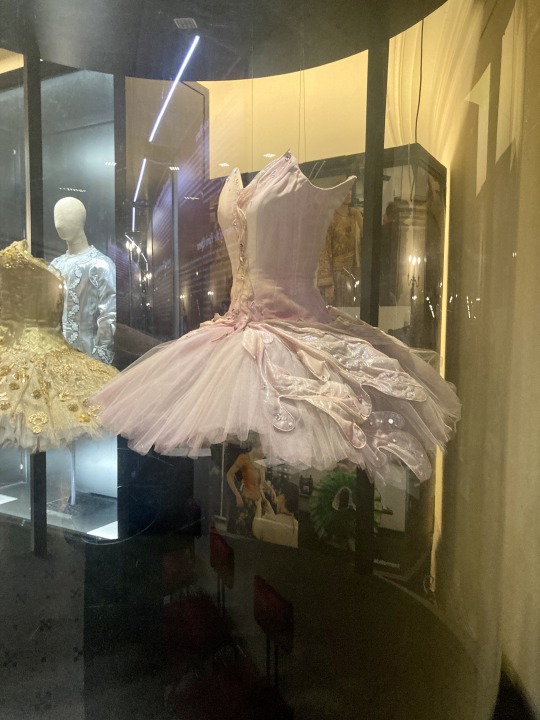






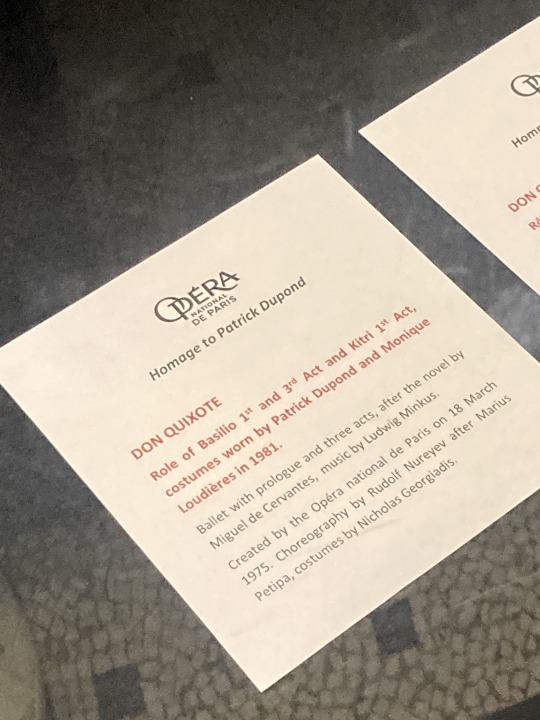
Took some photos of the exhibit up at the Opera Garnier for my own (cough cough) research purposes and thought it might be helpful for others! Thought the Don Quixote dress looked awfully familiar!
Transcript of the information under the cut:
Gounod and Massenet at the Palais Garnier
Charles Gounod and Jules Massenet were two of the main composers who dominated the stage of the Palais Garnier around 1900, achieving a string of critically acclaimed successes. They embodied both a genre - that of grand opera with its hoses of star performers, featuring some of the greatest dramatic female singers of the day - and an artistic and financial system that led to the development of by-products and the golden age of the Paris Opera from its inauguration to the eve of the First World War. In 1859, Faust, based on Part 1 of Goethe's Faust (with a libretto by Jules Barbier and Michel Carre) was performed for the first time at the Theater-Lyrique. Charles-Francois Gounod's work was an undeniable success and was performed 70 times in its first year alone. It soon entered the repertory of the Opera and became a mainstay. Jules Massenet, another prolific composer who explored most musical genres, also achieved great success at the Palais Garnier with Le Cid, Thais, and Griselidis. Fascinated by Wagner, whom he discovered in 1860, Massenet rapidly developed his own style, and soon acquired a following. In his composition class at the Conservatoire, he taught a whole generation of opera composers, including Gustave Charpentier, Reynaldo Hahn, Xavier Leroux, and Gabriel Pierne.
Opera at the Palais Garnier around 1900
While Jules Massenet, Charles Gounod, and Giuseppe Verdi (who supervised the first performances of his words at the Palais Garnier himself) were all triumphantly acclaimed at the Paris Opera in their lifetimes, Wagner took a little longer to inspire the unanimous recognition of the Parisian public. His rise was slow but the deeply-rooted and Germany's most famous composer finally enjoyed genuine success thanks to the unremitting work of a management team headed by Andre Charles Prosper Messager (1908-1914) known as "Messager", and Leimistin Broussan, known as "Broussan". As a result, Paris audiences were able to see a performance of the entire Ring cycle for the first time in June 1911. At this period, the Palais Garnier hosted Serge Diaghilev's Ballet Russes company, and Richard Strauss' Salome and Saint-Saens Dejanire both entered the repertory. During the Belle Epoque, the Palais Garnier was one of the chief places for Paris society to meet and be entertained, with an audience of subscribers made up of leading financiers, industrialists, and politicians.
Major Ballets at the Palais Garnier
4 June 1875
Coppelia - Argument de Charles Nuitter et Saint-Leon, Musique de Leo Delibes, choregraphie de Louis Merante
Giselle - Livret de Theophile Gautier et Jules-Henry Vernoy de Saint-Georges d'apres Heinrich Heine, musique de Adolphe Adam, choregraphie de Jean Coralli et Jules Perrot (creation le 28 Juin 1841 a l'opera national de Paris). Ce ballet est tombe dans l'oubli, et a ete transmis par Marius Petipa en 1887. Giselle fait son retour au Palais Garnier en 1920
20 Juin 1921
Daphnis et Chloe
musique de Maurice Ravel, choregraphie de Michel Fokine, decors de Leon Bakst
9 Jullet 1935
Icare
Musique de Szyfer et Arthur Honegger, choregraphie de Serge Lifar, decors et costumes de Paul R Larthe d'apres Pablo Picasso
17 notes
·
View notes
Text
it seems like some people in the owl house fandom still need to hear this
Guys.
The Owl House is not going to end with Luz leaving the Boiling Isles behind and living in the human realm.
Luz has established so much of an actual whole life in the Boiling Isles, none of which can be easily left behind.
Take her relationship with Amity. Remember what Luz said to Amity when first asking to date her? She said "I don't know what my future's going to look like, but it would be so cool if you were in it." Does that seem like it would remotely make sense, after that, for it to just...end? With the two possibly never seeing each other again?
Her learning to be a witch too. It's such a big part of the show, the amount of time that’s been dedicating to her wanting to learn magic, to her finding the glyphs and teaching herself how to use them, developing and honing her skills with them, and that she’s fully enrolled in a school for magic too. It honestly feels very much like a whole life-ambitions thing. It would make no sense for her to just go back to a world where none of the skills she's spent so much time and effort learning can be used and just. Stay there.
The Owl House never felt like it was trying to send any anti-escapism message or anything like that. Luz hasn't treated the Isles like they're just a way to live out her fantasies and escape reality for a long, long time. Arguably since the beginning, even. She said in the first episode that it wasn't the PG fantasy world she'd always dreamed of. And the fact that her life on the Boiling Isles isn't some escapist fantasy has only gotten more and more clear over time, it's been pointed out by plenty of folks in this fandom before.
Honestly, everything Luz has gone through on the Boiling Isles and everything she's been doing there feels like putting down roots and charting out a whole life course there. And The Owl House overall has always been very much about making one's own decisions, deciding one's own future. There've been long text post essays on that. That's what Luz has been doing this whole time, and she's been doing it within the context of the Boiling Isles. It includes her mom, but it also includes everycreature she's come to know and love in the demon realm and everything she's been learning to do there, none of which would be applicable back on Earth.
Not to mention her mom is literally the ONLY thing she’s ever expressed wanting to go back to in the human realm, and we’ve known for a long time she was bullied and ostracized there, and in Thanks To Them Camilla’s nightmare flashbacks and some of Luz’s video diary entries only drove it in even further just how out of place she always was in the human realm. She’s more accepted on the Boiling Isles by now than she EVER was in the human realm. On her mom’s doorstep after the events of King’s Tide, she said “I’m back.” She didn’t say “I’m home.” When she did say “Yeah. I’m home.” after Camilla said she was glad Luz was home, I don’t think it could’ve been much clearer in her voice or her face (which the screen took a moment to fully focus on) that those words didn’t feel true to her.
When Luz DID decide in Thanks To Them that the best course of action for her would be to stay in the human realm, this was framed as being entirely wrong. Partly because it was out of a false belief that she would be of no help and only made people’s lives worse, and partly because it was very much established how she did not belong in the human realm. Camilla clearly knew Luz staying in the human realm wouldn’t be right as soon as she heard Luz say this. Her immediate and wholehearted response was “No, no way in heck am I letting you do that, don’t you even say that. You’re going back there, and now that I’ve seen what you’re up against, you’re taking me WITH you.”
Nothing about The Owl House feels like it’s leading into Luz saying goodbye to the demon realm and going back to living the rest of her life in the human realm. It would make no sense for the show to end like that, and everything about the show feels deliberately built up in a direction that goes completely against ending like that.
So yeah. Anycreature who’s been worrying about this, you can relax.
#the owl house#the owl house spoilers#the owl house season 2 spoilers#the owl house season 3 spoilers#the owl house season 2 finale spoilers#the owl house king's tide spoilers#the owl house thanks to them spoilers#major owl house spoilers#look i know the owl house gets compared to amphibia a lot but in this respect they're completely different#i argue that going back to earth permanently (or at least for ten years) wasn't a good ending for amphibia either#but amphibia hadn't built up EVERYTHING against that like the owl house has#getting back to earth was always anne's end goal and she was always shown to miss a lot more about it than just her family#she was never shown to be entirely happier with life and generally much better off in amphibia#(marcy was actually but that's a whole 'nother essay)#luz in contrast has basically nothing to go back to on earth and literally so much on the boiling isles#anne had a found family she loved with all her heart in amphibia and i argue it was entirely wrong to separate her from them#but she wasn't going to SCHOOL there#she didn't have a COMMITTED LONG-TERM RELATIONSHIP there#she wasn't DEDICATING HERSELF TO LEARNING SKILLS THAT COULD ONLY BE USED THERE#and building WHOLE LIFE PATHS around them#and amphibia at the end of the day did have the underlying themes of change it tried to preach in the finale#change has never been among the owl house's major themes#the major themes it does have point in an entirely different direction for the endgame
31 notes
·
View notes
Text
Vaganova Graduation Performances….
This is not my opinion, I'm just copying and pasting from a forum, so take it all with a grain of salt. But this is some random person's impression that I wanted to share. Given that it was posted in a forum, it's probably okay to disseminate here. Translated by my browser so forgive the poor translation. Not sure why some names are in bold.
What seems to have been buried is that Farouk Ruzimatov's son is graduating this year! I had no idea!
From the Russian dance forum Ballet Friends, user Marfa:
08\06\2023 - MT GRADUATION PERFORMANCE OF THE ACADEMY OF RUSSIAN BALLET NAMED AFTER A. Me. VAGANOVA 281 ISSUE
Mariinsky Theatre Symphony Orchestra
Conductor - Arseny Shuplyakov
IN THE PROGRAM:
Suite from the ballet Corsair. "The Lively Garden"
Music by Adolf Adam, Julius Gerber, Leo Delibes, Riccardo Drigo, Peter of Oldenburg, Caesar Puni, Albert Zabel
Choreography by Marius Petipa, Reconstruction and new choreographic edition of Yuri Burlaka, Suite compiled by Nikolai Tsiskaridze (2023)
Suite of characteristic dances from the ballet "Laurencia"
Music by Alexander Crane
Choreography by Vakhtang Chabukiani, Dancing restored by Irina Gensler (2015), Suite composed by Nikolai Tsiskaridze (2015)
Costume designer - Simon Virsaladze
Kovalev
Valiullina, Gureeva, Ermolaeva, Hare, Ivanova, Koshkareva, Davleeva, Prokopenko, Saplina, K. Kholodkova, P. Kholodkova, Sabanova, Grimm (USA).
Kasenkova
Aseeva, Vennitskaya, Ermolenko, Zeldina, Karamysheva, Kulikova, Kuprina, Potapova, Mor (Israel), Rissanen (Finland), Sharova
Ilyin
Gasparyan, Egorov, Kamenskikh, Mukhametshin, Ruzimatov, Karsel (Spain), Kodama-Pomfret (Great Britain)
Ermolenkov
Asadchenko, Gariffulin, Gobov, Didenko, Dobosch (Romania), Mikheev, Trunin, Chabron (France), Brancato (USA)
singled out those who participated in the concert and was noted in the program
The audience gathered interested, caring, friendly.
As always, teachers are in the tutoring room. The concert traditionally began with a welcoming speech by the rector, who, as usual, was a combination of black and white. He said that this graduation party is dedicated to Natalia Dudinskaya, who has done so much for our ballet. He said thank you to the teachers and wished both the audience and graduates a good evening.
Suite from the ballet Corsair. "The Lively Garden" was made up of
Waltz performed by students
Big Adagio, in which Medora - Kuprin, Gulnara - Barinov framed by corps de ballet were soloed
Trio of odalysok - Kotlyarova, Romanovich, Morozova
Dancing with baskets - senior students
Variations of the soloist - Rissanen
Variations of Gulnara - Barinov
Variations of two soloists - Solomina, Chobota (Romania)
PAS DE DEUX - Koshkareva, Kodama-Pomfred (UK)
Intermezzo students
Variations of Medora - Kuprin
Koda - students
Everything is very beautiful, gentle, the corps de ballet looks marshmallow, there are younger students in the form of arapchat for splendor. Branches-wrears of roses, at the end of Medora - Koshkarev is placed on a pedestal in the form of a large basket of roses.
Kuprina and Barinova danced charmingly from beginning to end, with corps de ballet, that solo. Barinova, in my opinion, looked no worse than Kuprin's produced.
I liked Morozov the most of the odalys. The packs are beautiful, similar to thin embroidered lace.
Rissanen, of course, is quite a baby, with a strong body, but very cute and danceable, charming.
The central number of PAS DE DEUX, in which Kodama-Pomfred danced brilliantly like an adult, both variations were breathtaking, high, flying, with beautiful landings, emotionally just like Kim. He was met with violent prolonged applause. In my opinion, Koshkareva looked pale next to him, there was not so much emotional return. In the fuet, I drove a lot forward, and then also sideways. According to the ballerina type, Matvienko reminded me.
We received everyone very warmly. But it was Kodama-Pomfred who got the most. I really want his fate to develop, despite his not very tall height. He and his mother gave so much effort and money that he could get an education in the ARB, saw them collect donates through the social network to pay for education. It looks like my mother was at the concert and was just very happy with what she saw. I liked him very much.
Suite of characteristic dances from the ballet "Laurencia"
I saw her in 2015, then Shakirova and Borsai soloed. Full list https://marfa-ssv.livejournal.com/42351.html, there are many familiar surnames.
Valiullina - Laurencia, Dobosh (Romania) - Frondoso,
Alferov - Estevan, father of Laurencia, Chuzhanov - Juan, father of Frondoso,
Kulikova - Pasquala, Ilieva (Bulgaria) - Khasinta,
Asadchenko - Ortuño, Garifullin - Flores.
Girls: Zatoka, Gureeva, Palilionis, Karamysheva.
Flamenco: Davleeva (soloist), Efimova, Zeldina, Lavrentiev, Tikhomirov and senior students.
Dance with castanets: Morozova (soloist), Didenko (soloist), Saplina, Kalashnikova, Ermolenko, Ruzimatov, Mukhametshin, Trunin and senior students.
I looked with interest and with memories of 2015. I liked the whole collective characteristic part very much. A very temperamental bright soloist in Flamenco, it seemed to me that there was a problem with the shawl, but she did great. The two artists in black shawls had them dressed on different sides (one stripes up, the other inside out) is interestingly designed or a mistake? I remembered Olga Makarova, the heiress of a high-profile ballet surname who danced this part, it seems to me that the career of an artist in NOVAT did not work out very well, but Ksenofontov, who was not even a soloist in this dance, is now experiencing a rise there.
In the castanets dance, I again liked Morozova, who danced odalisk in the first part. She was successful in both classical and characteristic images.
I really liked Asadchenko and Gariffulin, thin-legged slender, terribly synchronous, light. Just a pleasure for the eyes.
Kulikova and Pascuala are cute. Valiullina certainly stands out for her stage charm, but she was less amazed than Raymonda last year. Dobosh didn't hit anything special.
8 notes
·
View notes
Text
here's a deep cut: the crew's strengthsfinder strengths. lots of pdfs of the full descriptions out there
Tuuri
Activator
Learner
Positivity
Intellection
Futuristic
Lalli
Strategic
Analytical
Competition
Intellection
Context
Reynir
Includer
Woo
Learner
Harmony
Positivity
Emil
Individualization
Competition
Significance
Futuristic
Empathy
Sigrun
Self-assurance
Developer
Woo
Competition
Ideation
Onni
Deliberative
Intellection
Discipline
Command
Relator
Mikkel
Analytical
Adaptability
Competition
Arranger
Developer
#more mildly deranged au deep cuts#my shit#sssscomic#the whole crew#stand still stay silent#if you understand this I'm sorry
6 notes
·
View notes
Text
Readerly Response #4
Due date of assigned reading: October 2
Title of assigned course reading: “Collaborative Reading and Writing: Learning in the Company of Peers” (Chapter 4)
Big Takeaway: For collaborative reading and writing to be effective, teachers must explicitly teach routines, have a purpose or goal for each activity, and scaffold students to ensure productivity.
Nugget: After reading this chapter, I realized that a lot of preparation must happen before students are ready to work collaboratively. For younger students, teachers need to explicitly teach skills that I take for granted, such as how to ask for help or disagree with someone. Teachers also must be very intentional with the activities they choose for students to complete collaboratively. I especially liked the concept of deliberative practice because it is structured to ensure students are challenging themselves and engaging meaningfully with their peers. The ReQuest approach was interesting, too. Teachers should scaffold students as they practice working in pairs, discussing a text, and formulating questions. This scaffolding can take the form of modeling what pair work looks like, providing a procedure for discussing the text, and providing question words for students to use. I can see myself using either of these practices in my classroom.
Title of assigned course reading: “Small-Group Reading Instruction: Targeted Support through Guided Reading.” (Chapter 5)
Big Takeaway: Small-group reading instruction enables students to practice what they have learned in whole-group instruction, receive scaffolding based on individual needs, and use their developing reading strategies alongside peers.
Nugget: I love sharing stories with children, so the guidance for class discussion is helpful. I liked the idea of having a ring of comprehension questions I could grab before the discussion. Using similar questions each time gives students practice answering them and allows them to know what to expect. I also liked the suggestion of having students direct their answers to the class instead of the teacher. Perhaps, to give students practice with this, I can have them discuss their answers in pairs or small groups before I call on a student to share with the class. Or, I can have a simple prompt, like “Tell your friends!” to encourage students to face the class instead of looking only at me when they talk.
Readerly Exploration Task: I chose the task where I documented my initial response after I read. First, I would read the chapter. Then, if something stood out to me, I would record how it made me feel or what it made me think. I would continue to read until something else stood out to me. Documenting my thoughts as I read was easy because I tend to do this. Whenever I read for fun, I annotate my books, and this task reminded me of that. I appreciated this readerly exploration because it allowed me to connect what I read to my elementary school experiences, what I see in field placement, and what I hope to do in my future classroom. I always understand the content better when I can provide an authentic example of how I observe it in my own experiences. For example, chapter four provided a sample calendar for introducing literacy routines in the classroom. I remember this calendar well because I connected it to my field experience and noted that I wanted to use something similar when I teach. Similarly, I remember how the text explains dyad reading because I wrote a question. What I observe in field placement is slightly similar yet very different from how the text describes the approach, and my question highlights this comparing and contrasting that took place while I read.
Multimedia Documentation: https://drive.google.com/file/d/1Gy6suTu2Z7vpKi3_OX-IuxbgQaNAiioy/view?usp=sharing
This is a link to my notes I took while reading. In yellow, I highlighted what came from the text. Underneath, I wrote my reflection.
2 notes
·
View notes
Text
"Themis, too, was the divine patron of communal harmony, or “Just Order,” as Walter Burkert calls her, or “the force that brings and binds men together, . . . the collective conscience, the social sanction,” in the words of Jane Harrison. Harrison draws attention to the role of Themis in Homer as convener of deliberative assemblies, showing her to be an embodiment of collective order. Themis so conceived is close in concept to the meaning of the Mother of the Gods in her later establishment in the Athenian Council House. The wisdom of Themis was not only collective, but was also closely allied with the divine sovereign, Zeus, whose counsel and bed she shares and by whom she bears Eunomia, Dike, and Eirene. Like Nemesis, she collaborated with Zeus in setting in motion the events that led to the Trojan War.
Themis is perhaps best known, according to Aeschylus’ formulation in the Eumenides, as mantis at Delphi after her mother, Gaea, Earth. Elsewhere Aeschylean tradition names her “Themis, Earth—she is but one in form though her names are many,” as the mother of Prometheus, who delivered a prophecy that enabled Zeus to win kingship over the gods. As mother of Prometheus, Themis was also mother-in-law to Asia, according to a Greek tradition rivaling the Lydian account in Herodotus; according to a tradition attested by Apollodorus, the mother of Prometheus was Asia herself.
The identification of Themis as Asia, or as the Asiatic Mother of the Gods, as implied by these theogonic traditions, is demonstrated in the archaic image of the Mother among the battling gods and giants on the north frieze of the Siphnian Treasury at Delphi. In modern scholarship, this figure in the Siphnian Gigantomachy has been commonly called Kybele after her attribute, the lion-drawn chariot in which she rides and with which she strikes. Recently this identification has been emended to Themis on the basis of a corrected reading of the traces of a painted inscription naming the goddess on the frieze. The label should be seen as an amplification, however, and not a change in our understanding of the identity of this figure, who so clearly represents the unstoppable power of the Asiatic Mother as she was known among Ionians and islanders.
In chapter 5, I advanced the suggestion that the Siphnian Treasury at Delphi was part of the program developed by Polycrates of Samos for promoting an Ionian-centered vision of Panhellenism. The appearance of Themis-Kybele in the Gigantomachy frieze, as well as the overall composition of the frieze itself, gives strong support to this suggestion. The cosmic Battle of the Gods and Giants depicted the triumph of divine sovereignty, the rule of Zeus, as an achievement of collective action. In the Siphnian Gigantomachy, the unusual figure of Themis-Kybele assumes a prominent role as a champion of collective cosmic sovereignty, taking a place usually occupied, in Athenian Gigantomachies, by Athena. Themis-Kybele drives a chariot placed so as to give her a prominence equal to Poseidon (also driving a chariot) and second only to Zeus (also driving a chariot) in the center. Athena is present, but her place close to Zeus has been taken by Hera, who is the patron goddess of Samos. The entire effect is consistent with Polycrates’ efforts to align divine symbols with his ambition to become ruler of the sea and of the coastlands of Asia.
The goddess labeled “Themis” and displaying the attributes of Kybele on the Siphnian frieze demonstrates that the goddess of Asia, in her role as the upholder of cosmic order, was more readily envisioned as a member of the Olympian pantheon when the earthly foundation of this vision was centered toward the east, in the Ionian Aegean. Themis, in this guise, is in fact Kybele, or the Mother of the Gods, with all that this implies for her links to Asia. The installation of the Mother at Athens, in “a symbolic centre of Athenian political life” (as Robert Parker puts it), betokens a shifting toward the east in the concept of the centering of Athenian dominion.
At Athens and elsewhere on the Greek mainland, Themis shared cult and identity not only with Earth and with Nemesis, but also with Demeter and especially with Aphrodite. On the southern slope of the Acropolis, Pausanias describes a group of associated cults beginning with a temple of Themis, in front of which is a monument of Hippolytus, recalling his fate at the hands of Aphrodite, followed by a cult of Aphrodite Pandemos and Peitho, and cults of Ge Kourotrophos (Earth, Nurturer of the Young) and Demeter Chloe (Green, or Verdant), and he concludes: “You can learn all about their names by conversing with the priests.” Elsewhere in Greece, Themis is frequently associated in cult with Aphrodite. This affiliation reveals Themis as an expression of the rightful relationships resulting from the bonds of love promoted by Aphrodite. Themis, consort of Zeus, is thus recognizable as another impersonation of the divine Mother, who was knowing prophetess, attractive bride, wife of the all-powerful king, and mother of the attributes of justice."
- The Mother of the Gods, Athens, and the Tyranny of Asia: A Study of Sovereignty in Ancient Religion by Mark Munn
3 notes
·
View notes
Text
Tagged by @gametriprant <3
15 questions, 15 people
Nickname: malko on the internet, and i don't go outside so...malko
Sign: virgo
Height: 1,78 (allegedly. Let's say 1,75 so certain individuals won't get mad at me)
Last Thing I Googled: Michael Sheen's daughter age. I can explain it but I rather not.
Song Stuck in my head: can't stop thinking of this
Number of followers: 2150, 2000 of them are porn bots
Amount of sleep: 7 - 8h because I'm trying to be healthy and productive and the bestest of girls
Dream Job: Aristocrat
Wearing: my very aristocratic pyjamas: pink pants with sheeps on them and an old gray sweater
Movies/Books that summarise you: the shape of water. I won't further develop.
Favourite Song: can't pick only one, depends what i'm obsessed with at the moment. But I can tell you this year i've listened to Gekka no Yasoukyoku at least 3284923859234823942384293482394238492894289 times
Favourite Instrument: accordion. Soon as I get my dream job I'll buy one.
Aesthetic:

Favourite Authors: Oscar Wilde, Miguel Delibes, Poe, Guy de Maupassant, Junji Ito, Shinichi Sakamoto, Voltaire,,,,
Random Fun Fact: I'm so bad at thinking facts, fun or not, about myself because I keep constant noise to precisely avoid thinking about myself.
I'd tag 15 people but I really don't know 15 people that still active on here. I'm talking to the void right now.
10 notes
·
View notes
Text

What Practical Value Exists In Out Of Body Experiences?
I recently had my first Out of Body Experience (OBE), also known as a “projection of consciousness”. In the weeks following that experience I have had many more. In a client session this week, I shared one recent travel. My client’s response was instructive.
“What is the utility of such experiences?” He asked. Meaning, what practical value do OBEs offer?
Well, it’s a good question. While such experiences provide fantastic subjective revelations, their practical value escapes most people. But that’s because most people don’t look very deeply into spiritual matters. And even some who do look miss the value.
Some may know of religious ascetics. These people renunciate the world to explore nonphysical. Such men and woman hole themselves up in monasteries or even caves sometimes. They practice rites and rituals known to trigger mystical experiences.
But the rest of us have lives.
We have careers. Our families put demands on us. Bills need paying. Hobbies and friends consume our time. Who wants to spend their life constantly meditating? Moreover, why?
Again, our lives suggest OBEs hold no practical value. Especially considering the time cultivating them takes. So is there no practical value at all in them?
I suggest the exact opposite. Tremendous practical value exists in such explorations.
The power of tapping in
For sure, experiencing an OBE takes some doing. That’s why I suggest my clients make their Positively Focused practice a full-time job. That doesn’t mean quit day-jobs and families. It does, however, mean they prioritize their practice.
For while the practice’s early stages bring satisfying rewards – increased calm, peace, and general physical, emotional and mental well being – the biggest rewards come at later levels. Yes, early stage practice delivers the Charmed Life a life where everything one wants, happens.
But the advance practice develops “occult powers”. Abilities people think are mystical, supernatural and magical. People think these things because such abilities are rare among humanity.
OBEs are hard to experience. Mainly, it’s because humans have too much resistance going on. Their doubt and disbelief are too great. Their belief constellations are too full of bogus beliefs about life and physical reality. And about themselves. Their thought processes aren’t inclined to ignite desiring such experiences. So tapping into this power, and there is power here, isn’t possible if one’s thoughts and beliefs run counter to the experience.
Achieving OBEs, therefore, is more about letting go of disbelief. Not practicing a new skill. Everyone already has the skill. It’s only masked by beliefs telling the believer such abilities aren’t theirs. Or don’t exist at all.
But those who dedicate themselves develop seemingly mystical power. The power of pure positive energy. The energy that creates universes.

^^Tapping in requires soothing old beliefs, not creating new skills.
The value: highly practical
My first OBE signifies an arrival. I’m at the point where I’ve significantly cleared away vibrational interference. Interference blocking natural “supernatural” abilities. I’ve turned the key that unlocks doorways. Doorways of multidimensional existence. Existence I can explore consciously.
Moreover, I can explore consciously those dimensions and retain the experience when returning to physical consciousness. That experience expands my understanding of what it means to Be. Because now I KNOW I am more than my body. I’m learning to KNOW death marks a transition, not the end.
For sure many people believe death isn’t real. Or they want to believe that. But few actually KNOW. Meanwhile, OBEs produce confidence one lives eternally by showing the traveller that they are more than their physical body.
The real, practical value of such experiences however, lies in one’s ability to accomplish one’s desires. And to up-level the realm of what’s possible.
Equipped with conscious deliberate connection to All That Is, one can leverage that in the real world. Such a person can accomplish what most think takes a lot of time. Or what nearly everyone thinks is impossible. She can cut out effort and “luck” people rely upon. Such a person can also bypass much of the nose-to-the-grindstone people think responsible for success. And they can do that in whatever field they choose.
Seth puts it plain:
“The responsibility of dealing with manipulation within the physical universe remains, but in some respects the nature of this manipulation changes. It becomes more direct: Physical properties are manipulated more and more on a mental level. Many actual physical intervening steps are cut out.”
-- The Early Sessions: Book 7 of The Seth Material
Jane Roberts
“Impossible” aspirations
So the practical value of this ability lies not in the ability. The ability is a sign post. The real value lies in leverage power existing in all the Universe in service of one’s desires. That way desires start fulfilling themselves.
That’s highly practical.
Armed with this power and leverage, a person begins questioning his or her limits. She realizes her limitlessness.
Then she starts testing herself. Her aspirations ascend beyond where most can imagine. That’s because most don’t believe OBEsare possible. Let alone what OBEs as signposts signify is possible.
From there the practitioner merges with her Broader Perspective’s perspective. It’s a conscious shift Seth describes:
“The ego becomes more similar to the inner ego than to its old self, comparatively speaking. This altered ego is aware of large portions of inner reality that were previously denied. Structurally it remains intact, and yet it has changed chemically, and electromagnetically. It is able to open up so that inner experience can be received. This is a cornerstone for consciousness and for personality development. It is only a first step, however. Without it, no further development of consciousness can occur.”
-- Excerpt From
The Early Sessions: Book 7 of The Seth Material
Jane Roberts
Realizing past incarnations
From here, the practitioner can integrate “intimate knowledge of all incarnations”. This realization holds tremendous value. Psychology has us thinking our mental health springs from our present lives. But psychology and medicine in general, fails to account for influences from our experiences in other dimensions. Dimensions happening simultaneously with this one. However, awareness of past incarnations means we can harness that information for positive change now. In this life.
So the Positively Focused practitioner transcends what it means to be human. Then, they accomplish things humans think impossible. When people see this person doing what they think impossible, a new normal gets created. One in which what people thought impossible, now becomes possible.
And in that, they directly aid in human evolution. Human REVOLUTION. An expansion of what it means to be human.
Finally, this explains why achieving such levels appears extremely difficult or impossible, even though it’s not. It appears that way on purpose. Because getting there is impossible until one aligns their way of being with that of All That Is. They must eliminate as much interference as possible. Few will make a go at it. And of those, few will achieve it. Even though everyone can.

^^The value is more than just clearing away old beliefs clouding what we think is possible. It literally furthers humanity’s evolution.
The potential is vast
That’s a built in safeguard. All That Is can’t have a bunch of undisciplined, mostly negative spirits running around nonphysical. It would create mayhem across infinite dimensions. This development process happens in very slow motion here, on Earth. It is one of the reasons we come here. But that experience can greatly accelerate. And, it can happen in one lifetime.
Think about that. Would you be willing to dedicate a single life time so that in that life time you can achieve whatever you want, effortlessly, while having positive influence on humanity? And then influence all subsequent lifetimes from that same powerful perspective? I would.
I want to know my limitless power. These limitless powers are available for everyone. But accessing them only happens for the few. The few willing to see the world as it ultimately is: love, oneness, joyful and full of possibility. A willingness to see the world from a Positively Focused perspective, in other words.
Maybe you’re ready to develop your supernatural powers. If so, let’s talk.
#positive thinking#positive life#affirmation#positivevibes#positiveattractspositive#positive attitude#positiveapproach#spiritual journey#spiritual growth#spiritual life#spiritualawakening#spiritual ascension#out of body experience#positively focused#law of attraction#manifestations
2 notes
·
View notes
Text
The Influence of Herodotus on the Political and Moral Philosophy of Aristotle (V)
Dimka Gisheva-Gocheva (Sofia) “The influence of Herodotus on the practical philosophy of Aristotle” (Labyrinth, Vol. 18, No. 2, Winter 2016, available on https://www.academia.edu/37571279/DIMKA_GICHEVA_GOCHEVA_Sofia_The_Influence_of_Herodotus_on_the_Practical_Philosophy_of_Aristotle)
“6. The just in the rule of the majority
The Aristotelean account of the great advantages of democracy, the rule of the many, called politeia in his typology in the Politics, is greatly influenced by Herodotus: 1.In the view of Otanes the inherent feature of the rule of majority is stated to be ἰσονομίη –literally, the equity of all in respect of the requirements of the laws; the germane idea of the rule of law; 2. What a monarch does, never occurs under the rule of the many. The bitter experience of Otanes and his childhood trauma obviously influenced him to insist on this, but in tens of other stories in the Histories Herodotus narrates that there are perilous conse-quences of the unlimited power of a person first on himself. The boundless power of a ruler leads him to madness and disaster. 3. Another valuable characteristic in the rule of the many, according to Otanes, is the distribution of many public duties, positions and responsibilities by the lot -πάλῳ μὲν γὰρ ἀρχὰς ἄρχει. 4. Even more important is the responsibil-ity for these responsibilities, or translated into our modern parlance, the accountability of the persons, who have been in charge: ὑπεύθυνον δὲ ἀρχὴν ἔχει – the power is held into account, it is responsible. 5. Last in the speech of Otanes is the mode of decision-taking: all problems are discussed and resolved in common βουλεύματα δὲ πάντα ἐς κοι��ὸν ἀναφέρει. This might be read as the first advocacy of the deliberative democracy.
Later on in the fifth book of the Histories, two other important factors for the democratic developments in Athens and its subsequent leadership among the city-states are mentioned:ἡ ἰσηγορίη ὡς ἐστὶ χρῆμα σπουδαῖον...ἀπαλλαχθέντες δὲ τυράννῶν μακρῷ πρῶτοι ἐγένοντο ( V, 78) 9. Firstly, ἡ ἰσηγορίη, the equity-and-equality of the citizens on the agora, the participation of the citizens in the arguing and the decision-making of the public matters; and, secondly, the abolishment of the tyrants' regime, the hostility and the resistance to many despotic authoritarian practices - these are the healthy strengths of the Athenians, which lead their city-state not only to the economic prosperity, but also to the military and the political supremacy among the Greek communities.
The abolishment of the tyranny, which is the worst of all political orders, made Athens the mightiest Greek polis in the military aspect. The freedom of the citizens and the chances they received to work for the fulfillment of their private entrepreneurships enhanced the economic prosperity of the city as well. The work for the family property and the personal household, and not for the tyrant, who would expropriate the gain, became the basis of the Athenian polis. Another meaning of the concept ἡ ἰσηγορίη is to be pointed out. It means not only equity of the free men on the agora, the right to be equally eligible and to elect like all the rest free citizens. It signifies also the equity to participate and to cooperate in the exertion of the political power. Last, but not least it means freedom of speech, the equity of all deliberative positions of all free citizens, expressed in the public debates, in the discussions and the taking of decisions, especially the ones, passed by the assembly.
All of them are marked as the inner engines of the glory and the positive changes inthe polis by Aristotle in The politeia of the Athenians. Once more we see how brilliant examples of stories, used as instruments by the narrative method in the History of Herodotus, become implicit concepts in an Aristotelian text. In the institutional history and the constitutional stages in the development of Athens, the warfare is just mentioned: the Greek-Persian wars and the Peloponnesian war are just referred to, because The politeia of the Athenians was meant to be a sketch of the successive forms of the institutional self-governance of the city-state and not a political history. In this brief survey of the constitutional progressive development of Athens many of the explanations of the political evolution of the city-state are in harmony with the ones, proclaimed as the most influential ones by Herodotus.
9 See the pertinent commentaries of Robert W. Wallace and Paul Cartledge on this subject in The Origins of Democracy in Ancient Greece. (Raaflaub, Kurt A., Josiah Ober, and Robert W. Wallace2007).”
2 notes
·
View notes
Text
Executive Summary
Deceit and media manipulation have always been a part of wartime communications, but never before has it been possible for nearly any actor in a conflict to generate realistic audio, video, and text of their opponent’s political officials and military leaders. As artificial intelligence (AI) grows more sophisticated and the cost of computing continues to drop, the challenge deepfakes pose to online information environments during armed conflict will only grow.
To navigate that challenge, security officials and policymakers need a far greater understanding of how the technology works and the myriad ways it can be used in international armed conflict. Deepfakes can be leveraged for a wide range of purposes, including falsifying orders from military leaders, sowing confusion among the public and armed forces, and lending legitimacy to wars and uprisings. While these tactics can and often will fail, their potential to impact an adversary’s communications and messaging mean that security and intelligence officials will inevitably use them in a wide range of operations.
For policymakers and officials in democratic states, deepfakes pose a particularly difficult challenge. Given the importance of a trusted information environment to democratic societies, democratic governments should generally be wary of deepfakes, which threaten to undermine that trust. Yet security and intelligence officials in the United States and other democracies will nonetheless have strong incentives to deploy deepfakes against their adversaries, particularly in the context of armed conflict. As a result, the U.S. and its democratic allies should consider developing a code of conduct for deepfake use by governments, drawing on existing international norms and precedents.
Further, the U.S. should also consider establishing something like a “Deepfakes Equities Process,” loosely modeled on similar processes for cybersecurity, to determine when the benefits of leveraging deepfake technology against high-profile targets outweighs the risks. By incorporating the viewpoints of stakeholders across a wide range of government offices and agencies, such an inclusive, deliberative process is the best way to ensure deepfakes are used responsibly.
5 notes
·
View notes
Text
12 Books Every Aspiring Entrepreneur Should Read
Embarking on an entrepreneurial journey is both exhilarating and daunting. With the landscape of business constantly evolving, arming oneself with knowledge and insights from those who have navigated these waters successfully is invaluable. Below is a curated list of 12 books that every aspiring entrepreneur should read. These books cover a range of topics from starting up, scaling, innovating, to managing oneself in the process. They offer a blend of inspiration, practical advice, and timeless wisdom that can help pave the way for a successful entrepreneurial career.
The Lean Startup by Eric Ries
Eric Ries revolutionized the way startups are built and launched with his book, "The Lean Startup." It introduces the concept of lean manufacturing to the startup world, emphasizing the importance of building a minimum viable product, measuring its success in the market, and learning from the results to iterate or pivot. This book is a must-read for entrepreneurs looking to develop products or services in a resource-efficient manner.
Zero to One by Peter Thiel
In "Zero to One," PayPal co-founder and early Facebook investor Peter Thiel shares his philosophy on innovation and building companies that create new things. Thiel argues that doing what someone else already knows how to do takes the world from 1 to n, adding more of something familiar. But when you do something new, you go from 0 to 1. The book is a call to action to think for yourself and do something unprecedented.
The Hard Thing About Hard Things by Ben Horowitz
Ben Horowitz, co-founder of Andreessen Horowitz, a private venture capital firm, offers essential advice on building and running a startup. "The Hard Thing About Hard Things" doesn’t shy away from the difficult aspects of managing a business, including firing friends and poaching competitors. It’s filled with honesty, humor, and practical wisdom, making it a crucial read for entrepreneurs facing tough decisions.
The $100 Startup by Chris Guillebeau
Chris Guillebeau's "The $100 Startup" is a blueprint for launching a successful business on a shoestring budget. It emphasizes the power of harnessing one's passions and leveraging skills to create a profitable venture without substantial capital. The book is packed with real-life examples of individuals who have built businesses earning $50,000 or more from a modest investment, often starting with just a passion and a laptop.
How to Win Friends and Influence People by Dale Carnegie
Though not exclusively an entrepreneurship book, Dale Carnegie's "How to Win Friends and Influence People" is a timeless classic that offers invaluable insights into human relations. Carnegie’s principles on how to communicate, lead, and work effectively with others are fundamental for any entrepreneur looking to build a network, sell a product, or lead a team.
Thinking, Fast and Slow by Daniel Kahneman
Nobel laureate Daniel Kahneman's "Thinking, Fast and Slow" explores the two systems that drive the way we think: System 1 is fast, intuitive, and emotional; System 2 is slower, more deliberative, and more logical. Understanding these systems can help entrepreneurs make better decisions, understand their customers, and avoid common pitfalls in judgment and decision-making.
The E-Myth Revisited by Michael E. Gerber
Michael E. Gerber's "The E-Myth Revisited" dispels the myths surrounding starting your own business and shows how commonplace assumptions can get in the way of running a business. He walks you through the steps in the life of a business from entrepreneurial infancy, through adolescent growing pains, to the mature entrepreneurial perspective, the guiding light of all businesses that succeed. It’s a must-read for anyone who is thinking about starting a new business or has already embarked on the entrepreneurial journey.
Lean In: Women, Work, and the Will to Lead by Sheryl Sandberg
In "Lean In," Sheryl Sandberg, COO of Facebook, reignites the conversation around women in the workplace.
Sandberg combines personal anecdotes, hard data, and compelling research to cut through the layers of ambiguity and bias surrounding the lives and choices of working women. For female entrepreneurs, this book is a rallying cry to challenge the status quo and create fulfilling, impactful careers.
Start with Why by Simon Sinek
Simon Sinek's "Start with Why" explores the idea that great leaders inspire others by putting the Why (the purpose) before the How (the process), or the What (the product). Sinek argues that why you do something is more important than what you do or how you do it, and this principle can lead to greater success in business. This book is essential for entrepreneurs looking to build a compelling brand or to lead with purpose.
The 4-Hour Workweek by Timothy Ferriss
Timothy Ferriss's "The 4-Hour Workweek" challenges the traditional notion of the 9-5 workday and retirement, offering instead a blueprint to live more and work less. This includes tips on outsourcing your life, traveling the world without breaking the bank, and generating passive income. It’s an eye-opening read for aspiring entrepreneurs seeking to design a lifestyle that prioritizes freedom and fulfillment.
Good to Great by Jim Collins
In "Good to Great," Jim Collins identifies what it takes for companies to make the leap from good to great and how most companies fail to make the transition. Collins and his team of researchers delve into 28 years of data from 1,435 companies to distill the qualities that make a company truly great. This book provides valuable insights into leadership, discipline, and the importance of having a clear and compelling vision.
Shoe Dog by Phil Knight
"Shoe Dog" is the memoir of Phil Knight, the founder of Nike. It offers an unvarnished story of how Knight started Nike with $50 borrowed from his father and built it into one of the world’s most iconic, game-changing, and profitable brands. Knight’s journey is full of lessons on perseverance, overcoming challenges, and the importance of passion in entrepreneurship.
Conclusion
The journey of an entrepreneur is fraught with challenges, uncertainties, and opportunities for growth. The books listed above provide a wealth of knowledge, insights, and inspiration that can help guide aspiring entrepreneurs through their journey. From understanding the importance of starting lean, to mastering the art of leadership and decision-making, these books cover essential aspects of entrepreneurship that are critical for success. Whether you are just starting out or looking to take your business to the next level, these books offer valuable lessons that can help you navigate the path to success.
0 notes
Text
Phrόnêsis and the Precautionary Principle
As we evolve in the world as moral agents, as individuals, and as a part of diverse groups, we reflect in our daily lives practices of moral virtues: we are kind, courageous, disciplined, friendly. However, are those virtues enough in our ever-changing world? In a world where we need to consider the risks we are taking, as well as their consequences for us, and others. I argue that if one is to take risks, to consider the outcomes, negative, neutral or positive, of one’s actions, then one is responsible, morally, intellectually, emotionally, for one’s decisions and their consequences in their life, however many spheres the consequences are involving. I put forward the idea of a relational responsibility. Therefore, in such a world where every decision is intricately linked to the various spheres and relationships we engage in as individuals and as moral agents, what other virtue could we or should we be prepared to demonstrate? It seems that the virtue of phrόnêsis; of prudence, also understood as the wisdom of action, which is a practical disposition individual have towards their choices; is to be considered with attention. Indeed, the virtue of phrόnêsis is linked with what one can consider to be contingent, with what concerns human affairs (ϕρόυησις), this can be otherwise defined as a practical wisdom. Which signifies that phrόnêsis is a practice of wisdom, considering our action constituted in time, phrόnêsis is a vertu that any moral agent should have et which one should demonstrate the capacity in order to take into account of one’s actions in the present without forgetting those done in the past nor the many possible relational consequences they hold. I think the moral agent has to be cautious, prudent, in the sense that one’s understanding must be able to advise one on the actions and choices that are open. Ethics is, thus, only ever present, although moral agents act with deep concern for the future.
Since I am considering the Aristotelian principle of phrόnêsis, I consider closely the Nichomachean Ethics, Book VI in particular. According to the philosopher, phrόnêsis is an intellectual virtue, meaning that it participates to the excellence of the mind. A virtue is an acquired ability, a skill, a habit, une disposition de l’esprit for acting and feeling certain ways. It is the result of a practice, of exercises. Since phrόnêsis is considered as a virtue, it is, by its very own definition, the best habit within its specific field or kind of activity. One has to understand that phrόnêsis is a non-theoretical virtue, it intervenes, it prescribes, it deals with what can change or be brought inti existence, depending on what one does or doesn’t do. It concerns things that we do ourselves and can control, such as things we decide on, choose, initiate, change, develop, stop, or any other action which variables absolutely depend on us and our decisions to evolve and change.
Understanding that phrόnêsis is a way of using our intellectual capacities, our lόgos, it is a way of reasoning or arguing about what to do. It is a deliberative sort of reasoning, meaning that it searches for and weighs arguments, their pros and cons, considering the particularities of a certain situation we might find ourselves in. As a deliberative capacity phrόnêsis is inherently attached ontologically to any other virtue, friendship, courage, justice, etc. Which signifies that we cannot be prudent without being ethically good. To act in an ethically good manner we have to act correctly, i.e.: we have to do what is both right, what is correct, and what is good. To be truly virtuous, as moral agents, our actions must come from a virtuous disposition and be done with the right reason or the right justification, and phrόnêsis is right reason in such a matter. Thus, phrόnêsis is in itself an ethical virtue, a virtue of character.
Therefore, phrόnêsis deliberates about how I should be just, fair, friendly, courageous, caring in relation to other people in the here and now, people with different needs, different wishes, different ways of thinking and perceiving the world, different ways of knowing who I am and what I could mean to them, while respecting their autonomy and thinking minds and wills, separate from mine as individuals and moral agents themselves. As such, there is no precept, no precise instruction on how to do it. This virtue does not try to manipulate, or persuade or seduce others, it presents its own thinking and reasons for deciding and acting in certain ways, as openly and transparently as possible to the mindful judgement of others and of the self, in order to show, to convince.
We understand that phrόnêsis is considering where others are, emotionally and intellectually, in their skills, their attitudes, in trying to find the right thing to do. However, phrόnêsis cannot use these circumstances in a manipulative manner, in setting some manipulative agenda, without ruining itself as a virtue. As such, phrόnêsis must know how to deal with egotistical, strategic, manipulative behaviour in others without becoming it, but also without letting such behaviour prevail in others. Which is why phrόnêsis is both ethical and intellectual. We would blame someone for forgetting or neglecting the intellectual exercise in dealing with others fairly, because abstaining consciously and voluntarily from deliberating the pros and cons on what to do would be considered an ethical deficiency, and because we would blame someone for deliberating merely in a clever fashion for other, probably unethical, purposes while dealing with others.
Moreover, phrόnêsis differs from pure rhetoric, because it searches openly for the best thing to do, weighing arguments, it is not deliberately persuasive. We think that true deliberation is more often than not open-ended. In such a way that the most important aspect of phrόnêsis is that it deals with particular circumstances in connection with acting.
Once we have understood that we needed the virtue of phrόnêsis in order to be better moral agents in the world, for ourselves and in our relations to others, we must think deeply about what every decision we make and our relational responsibility towards others, as individuals who are part of many interlapping and interwoven groups and ecosystems. There intervenes the Precautionary Principle.
The Precautionary Principle, also known as the precautionary approach, is a broad epistemological, philosophical approach to innovations, things, actions, choices, policies with potential for causing harm wen extensive scientific or specifically subject-related knowledge on the matter is lacking. It emphasises caution, pausing and reviewing before leaping into new innovations, ideas, policies, choices which may prove disastrous. The precautionary principle was promulgated in philosophy as a means to modify ethics so that the distant effects of one’s actions should be considered, thus prescribing that one should act in order for the effects of one’s actions to be compatible with the permanence of genuine human life. The precautionary principle makes us act in such a way that our present actions, choices, policies, innovations, etc. do not compromise the conditions for an indefinite continuation of humanity on Earth.
There are three main motivations behind the postulation of a precautionary principle. First, it stems from a deep dissatisfaction with how decisions were made in the past: often, early warning have been disregarded, leading to significant damage, which could have been avoided by timely precautionary actions. This motivation for a precautionary principle rests on some inductive evidence that we should reform or even, replace our current practices of risk regulation, demanding that uncertainty must not be a reason for inaction. Secondly, it expresses specific moral concerns, usually pertaining to the environment, human health, and future generations. This second motivation is often related to the call for sustainability and sustainable development in order to not destroy important resources for short-time gains, but to leave future generations with an intact environment. Thirdly, precautionary principles are discussed as principles of rational choice under conditions of uncertainty and ignorance. Typically, rational decision theory is well suited for situations where we know the possible out-comes of our actions and can assign probabilities to them/ However, the situation is different for decision-theoretic uncertainty; which is where we know the possible outcomes but cannot assign anu or no meaningful and precise probabilities to them; or decision-theoretic ignorance; which is where we do not know the complete set of possible outcomes. Though, it is far from clear way is the most rational way to decide when we are lacking important information, and the stakes are high. Precautionary principles are one proposal to fill the gap.
There are three categories existing withing the idea of precautionary principles which are action-guiding principles; they tell us which course of action to choose given certain circumstances; there is also a set of epistemic principles; which tell us what we should reasonably believe under conditions of uncertainty; and procedural principles; which express requirements for decision-making and tell us how we should choose a certain course of action. These categories can overlap, such as when action or decision-guiding principles come with at least some indication for how they should be applied.
I would like to consider an interpretation of precautionary principles as action-guiding principles, which stresses that principles have to be interpreted and concretized depending on the specific context. Then, we could consider the precautionary principle to be a virtue principle, interpreting the precautionary principle by using cautiousness as a virtue. In this way, “cautious” is interpreted as a virtue term that refers to a property of an agent. It is possible to identify what the virtuous agent would do, either because it seems obvious, or because some agreement can be reached. Interpreting a precautionary principle as a virtue principle will avoid objections of extremism and paralysis, because it emphasizes balanced and context-sensitive decision-making. It is unlikely that the virtuous agent will choose courses of action which will, in the long term, have overall negative effects, or that are self-refuting. Another way to consider precautionary principles as action-guiding, is to think of precautionary principles as an alternative to maximin and other strategies for decision-making in situations where we lack the type of empirical evidence that one would need. Thus, according to this line of thinking, we could consider that one should take reasonable measures to prevent threats that are plausible and serious, having considered precautionary principles as reasonable measures. The seriousness of a threat relates to its potential for harm, as well as to whether or not the possible damage is seen as reversible or not, we should emphasize that reasonableness is a highly pragmatic and situation-specific concept. Reasonable responses should be effective, proportional to the nature of the threat, take a realistic attitude toward the threat, be cost-effective, and be applied consistently. This shows us that the question when a threat should count as plausible enough to warrant precautionary measures I very important for the application of an action-guiding precautionary principle.
Thus far we have understood that precautionary principles are a strategy we can all employ in our decision-making process, while seeking to anticipate and prevent harm to ourselves and others, to society or the environment in the face of uncertain risks. I suggest that we can easily integrate phrόnêsis into our understanding of precautionary principles and that it can be understood in a few aspects. Firstly, both concepts necessitate a deep, contextual understanding. Just as phrόnêsis requires a comprehensive grasp of the situation, the precautionary principle also demands a thorough understanding of the potential risks and benefits associated with a particular action or policy. This includes understanding the scientific, social and environmental contexts. Secondly, both emphasize ethical decision-making: while the precautionary principle is focused on preventing harm, phrόnêsis involves making decisions that are beneficial not just for the individual, but also for the community as a whole. Thirdly, prudence is a key aspect of both phrόnêsis and the precautionary principle. In situations of uncertainty or incomplete knowledge, both principles advocate for a cautious approach. Lastly, both are action oriented. They are not solely about theoretical understanding, but about applying that understanding to make real-world decisions. Therefore, we can understand the phrόnêsis is seen as providing a philosophical foundation for the precautionary principle. This relationship between phrόnêsis and the precautionary principle highlights the importance of practical wisdom in policy-making and decision-making processes.
#philosophy#philosophie#my writing#inspired#essay#philosophy of risk#ethics#aristotle#phronesis#precautionary principle#éthique#philosophie du risque#principe de précaution
0 notes
Text
Online forum for Democratic deliberation
In the digital age, online forums have become powerful tools for democratic deliberation. These platforms allow people to discuss issues, share opinions, and influence decision-making processes. In this blog, we will explore how online forums can enhance democratic governance, improve transparency, and foster public engagement.
What is Democratic Deliberation?
Democratic deliberation is a process where citizens discuss and debate issues that affect their communities or nations. It is a way for people to express their views, consider different perspectives, and work together to make decisions. Traditionally, democratic deliberation took place in town hall meetings, public hearings, and other face-to-face settings. However, as technology has advanced, online forums have become an important part of this process.
The Role of Online Forums
Online forums are digital spaces where people can post messages, reply to others, and engage in discussions. They are accessible from anywhere with an internet connection, making it easier for more people to participate in discussions. Here’s how online forums play a role in democratic deliberation:
Increased AccessibilityOnline forums allow more people to participate in discussions. Unlike physical meetings that require people to be in the same place, online forums can be accessed from anywhere. This means that people who may have difficulty attending in person due to distance, disability, or time constraints can still have their voices heard.
Diverse PerspectivesOnline forums bring together people from different backgrounds and experiences. This diversity can lead to richer discussions and more comprehensive understanding of issues. Participants can learn from each other and consider different viewpoints that they might not encounter in their local communities.
Convenience and FlexibilityOnline forums offer flexibility in terms of when and how people participate. Discussions can happen in real-time or over a longer period, allowing participants to contribute at their convenience. This flexibility can lead to more thoughtful and well-considered contributions.
Transparency and AccountabilityMany online forums are public or semi-public, meaning that discussions are visible to others. This transparency can help hold participants accountable for their statements and arguments. It also allows others to see how decisions are being made and how different viewpoints are being considered.

Benefits of Online Forums for Democratic Deliberation
Online forums provide several benefits that can enhance democratic processes:
Broader ParticipationBy removing geographical barriers and offering flexible participation options, online forums can increase the number of people involved in discussions. This broader participation can lead to more representative and inclusive decision-making.
Improved CommunicationOnline forums offer various tools for communication, such as text, images, and links to other resources. This variety can help participants express their ideas more clearly and engage in more meaningful discussions.
Documented DiscussionsOnline forums often keep records of discussions, making it easier to track conversations and decisions over time. This documentation can be valuable for reviewing past discussions and understanding how conclusions were reached.
Encouragement of Deliberative SkillsEngaging in online discussions can help people develop skills such as critical thinking, argumentation, and empathy. These skills are important for effective democratic deliberation and can contribute to a more informed and engaged citizenry.
Challenges of Online Forums
While online forums offer many benefits, they also come with challenges that need to be addressed:
Digital DivideNot everyone has equal access to the internet or digital devices. This digital divide can limit participation in online forums, particularly among marginalized or low-income communities. Efforts should be made to ensure that online forums are accessible to all.
MisinformationOnline forums can sometimes become sources of misinformation or false claims. It is important to have mechanisms in place to verify information and address inaccuracies to maintain the credibility of discussions.
Moderation and HarassmentOnline forums can sometimes be plagued by negative behavior, such as trolling or harassment. Effective moderation is necessary to create a respectful and productive environment for discussions.
Information OverloadThe sheer volume of information and discussions in online forums can be overwhelming. Participants may find it difficult to keep track of important points and contributions. Clear organization and summarization of discussions can help address this issue.
Examples of Successful Online Forums
Several online forums have successfully contributed to democratic deliberation and public engagement. Here are a few examples:
Participatory Budgeting PlatformsParticipatory budgeting platforms allow citizens to propose and vote on how public funds should be spent. These platforms have been used in various cities around the world to involve residents in budgeting decisions and ensure that public spending reflects community priorities.
Online Citizen PanelsSome governments and organizations use online citizen panels to gather input on specific issues or policies. These panels consist of a diverse group of participants who provide feedback and recommendations on various topics.
Public Consultation WebsitesPublic consultation websites are used by governments and organizations to seek input on policy proposals or projects. These websites often include forums where people can discuss ideas and provide feedback.
How to Participate in Online Forums
If you want to get involved in online forums for democratic deliberation, here are some tips:
Find Relevant ForumsLook for online forums that focus on topics you are interested in or issues that affect your community. Many forums are organized by topic or area of interest, making it easier to find relevant discussions.
Engage RespectfullyWhen participating in online discussions, it’s important to be respectful and considerate of others’ opinions. Avoid personal attacks and focus on constructive dialogue.
Verify InformationBefore sharing information or contributing to discussions, make sure to verify its accuracy. This helps maintain the credibility of the forum and ensures that discussions are based on reliable information.
Be Open-MindedApproach discussions with an open mind and be willing to consider different perspectives. Engaging with diverse viewpoints can lead to more informed and balanced discussions.
Conclusion
Online forums are valuable tools for democratic deliberation, offering increased accessibility, diverse perspectives, and opportunities for meaningful engagement. While there are challenges to address, such as the digital divide and misinformation, the benefits of online forums in enhancing democratic processes are significant. By participating in online forums and contributing to constructive discussions, citizens can play an active role in shaping their communities and improving governance.
For more updates on transparent governance and public trust fund discussions, visit Metropolitan Global.
0 notes